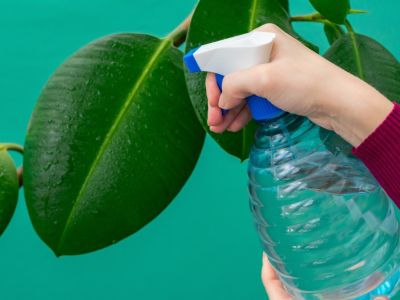What is Horticultural Soap?
What is horticultural soap? Horticultural soap is not a cleaning product for foliage–it is an environmentally friendly application used to eliminate small soft-bodied insects such as aphids, whiteflies, spider mites, and mealybugs. Horticultural soaps may be used either on indoor houseplants or on outdoor plants, including vegetables. Insecticidal soaps have several advantages over pesticides in that they leave no nasty residue, are non-toxic to animals and birds, and do not harm beneficial insects. They are often also less expensive solutions to pest problems. Horticultural soaps are derived from petroleum or plant oils. When horticultural soap is sprayed onto the plant’s foliage, it comes into contact with the pest and kills it. Horticultural soaps disrupt the cell membranes of the insect, resulting in suffocation. To be most effective, horticultural soaps must be applied vigilantly and thoroughly and may need to be reapplied weekly until you attain the desired result. Insecticidal soaps also have a beneficial effect in the removal of sooty mold, honeydew, and other leaf fungi.
Soap Spray for Plants
Insecticidal soap may be made at home using ingredients that are commonly used and found around the house. That said, most garden professionals recommend using a commercial soap spray that is specifically formulated for this purpose and is safer to use with more predictable results. Commercially formulated horticultural soaps are readily available at most garden supply stores and are sold as either concentrate or ready-to-use (RTU).
How to Make Insecticidal Soap
There are several ways to make insecticidal soap. The choice depends on the ingredients on hand and the extent to which one wants to use natural ingredients, i.e. those without perfumes or dyes. To make insecticidal soap, simply mix the following horticultural soap recipe ingredients thoroughly:
Combine one cup (240 mL.) of oil, any variety, such as vegetable, peanut, corn, soybean, etc. with one tablespoon (15 mL.) of dishwashing liquid or other “pure” soap. Be sure to avoid any dishwashing liquids which contain degreaser, bleach, or those that are for an automatic dishwasher. Mix two teaspoons (10 mL.) of this “soap” mixture to every cup (240 mL.) of warm water and put into a spray bottle. Mix only what is needed for a one-day application.
Alternate Horticultural Soap Recipe
Homemade horticultural sprays can also be made using a natural soap product without synthetic additives or perfumes, which can be found in local natural food stores. Combine one heavy tablespoon (15 mL.) of liquid soap to one quart (1 L.) of warm water. Tap water is okay to use, but if you have hard water you may want to substitute bottled water to avoid any soap scum buildup on foliage. To either of these soapy concoctions, a teaspoon (5 mL.) of ground red pepper or garlic may be added to further repel chewing insects. Also, a teaspoon (5 mL.) of cider vinegar may be added to assist in the removal of powdery mildew. Bar soap may also be used in a pinch by placing it into a gallon (4 L.) of water and leaving it to sit overnight. Remove the bar and shake well before use. There are few limitations to horticultural soaps. Just be sure to thoroughly wet the insects, and be aware that effectiveness may be limited if the soap solution dries or washes away. Phytotoxicity may occur if applied during hot days, so avoid spraying if temperatures are over 90 F. (32 C.). BEFORE USING ANY HOMEMADE MIX: It should be noted that anytime you use a home mix, you should always test it out on a small portion of the plant first to make sure that it will not harm the plant. Also, avoid using any bleach-based soaps or detergents on plants since this can be harmful to them. In addition, it is important that a home mixture never be applied to any plant on a hot or brightly sunny day, as this will quickly lead to the burning of the plant and its ultimate demise.
